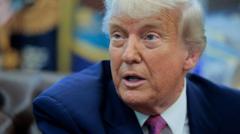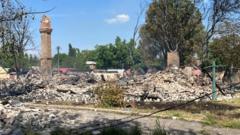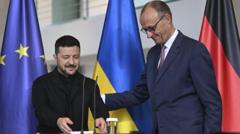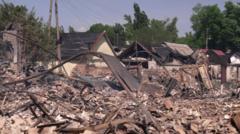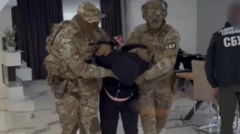As hostilities between Ukraine and Russia persist, both countries are grappling to set the agenda and pace for peace talks. Ukrainian Foreign Minister Andrii Sybiha publicly criticized Russia for not delivering a promised memorandum outlining its peace conditions. He stated that Ukraine requires this document prior to dispatching its delegation for a proposed meeting in Istanbul on Monday, describing it as essential for any discussion to be "substantive and meaningful."
Ukraine Accuses Russia of Delaying Peace Talks: A Deepening Stalemate

Ukraine Accuses Russia of Delaying Peace Talks: A Deepening Stalemate
Ukraine's foreign minister claims that Russia is hindering potential peace negotiations by failing to provide key documents that would facilitate discussions.
Kyiv's strategy remains focused on achieving a cease-fire before engaging in broader peace discussions, yet Russia appears reluctant to agree to such a truce. The Kremlin's position has emphasized a desire to address the "root causes" of the conflict, often perceived as an effort to impose its own terms, including demands around NATO's eastward expansion—something that Ukraine and its allies view as a threat to its sovereignty.
In earlier talks held in Istanbul, both nations had tentatively agreed to exchange peace proposals, which resulted in a significant prisoner swap but yielded little in terms of progress toward resolving the ongoing conflict. While Ukraine submitted its peace conditions to both Russia and the United States in anticipation of the planned talks, Russia asserted that it would only present its terms during the upcoming negotiations, prompting further accusations of stalling from Ukraine.
This ongoing diplomatic impasse illustrates the complications inherent in navigating peace negotiations amid active military conflict, with external influences like U.S. policy also shaping the dynamics between the two nations. As the situation unfolds, the international community remains poised to observe the ramifications of this stalemate on the broader geopolitical landscape.
In earlier talks held in Istanbul, both nations had tentatively agreed to exchange peace proposals, which resulted in a significant prisoner swap but yielded little in terms of progress toward resolving the ongoing conflict. While Ukraine submitted its peace conditions to both Russia and the United States in anticipation of the planned talks, Russia asserted that it would only present its terms during the upcoming negotiations, prompting further accusations of stalling from Ukraine.
This ongoing diplomatic impasse illustrates the complications inherent in navigating peace negotiations amid active military conflict, with external influences like U.S. policy also shaping the dynamics between the two nations. As the situation unfolds, the international community remains poised to observe the ramifications of this stalemate on the broader geopolitical landscape.








